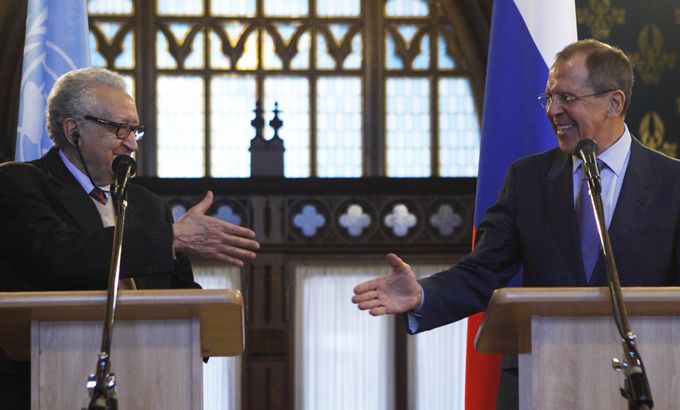
Is a diplomatic truce in sight for Syria?
We ask if UN-Arab League mediator, Lakhdar Brahimi can help end the Syrian crisis after talks with opposition.
Diplomatic efforts to reach a peace deal in Syria appear to be gaining momentum. The UN-Arab League mediator, Lakhdar Brahimi, is trying to achieve what his predecessor, Kofi Annan, could not – an end to 21 months of fighting.
|
“Brahimi has been relatively ineffective. He has been using same script as Kofi Annan – the Geneva communique – which has one major flaw within it – which is: there isn’t agreement with regards to Assad. We cannot start a transition, in my view, in Syria until there is a clear agreement that Assad has to go and he has to go immediately.“ – Salman Shaikh, director of the Brookings Doha Center |
Lakhdar Brahimi is in Moscow after nearly a week in Syria briefing the Russian foreign minister on his discussions with President Bashar al-Assad and opposition groups.
The peace envoy says he is embarrassed about the situation in Syria but is also warning that it could become a failed state.
“The object of everybody to act in a responsible manner inside Syria, in the region, in the Middle East and around the world to help the Syrians stop their dissent into more and more bloodshed, more and more chaos and perhaps in a failed State.”
On Thursday – Russia – Syria’s main ally at the UN Security Council, said that it has invited the opposition Syrian National Coalition (SNC) for talks and is urging President Assad to do the same.
But the SNC says Russia must condemn President al-Assad before any dialogue can take place.
|
“There is a major tone in the negotiations … the suggestions he [Brahimi] made in the last few days indicate a major change of the Western position, not the Russian change – the Russian position that has stayed the same. Obviously the West no longer requires President Assad to step down immediately.“ – Dimitri Babich, a political analyst at Russia Profile |
Sergey Lavrov, the Russian foreign minister, says a transitional government should be put in place, with al-Assad staying in power.
Lavrov said: “We are against any interference from outside parties, outside countries in Syria. We have an understanding that we need a ceasefire in order to save the lives of citizens and we agree that the Geneva Convention contains the elements to move forward for a political settlement.”
But the envoy has warned there are two choices for the country’s crisis: “If the only alternative is really hell or a political process, then we have got all of us to work ceaselessly for a political process. Difficult, complicated but there is no other choice.”
Inside Syria, with presenter Adrian Finighan, discusses these latest developments with guests: Dr Yazan Abdallah, a Syrian political activist and a member of Syria Dialogue – a group calling for transitional change in Syria; Dimitri Babich, a political analyst; Radwan Ziadeh, a member of the Syrian National Council; and Salman Shaikh, director of the Brookings Doha Center.